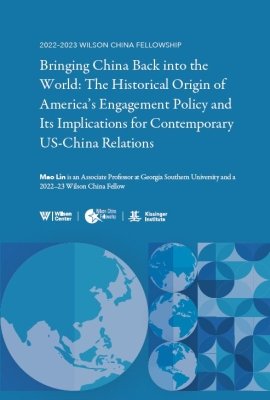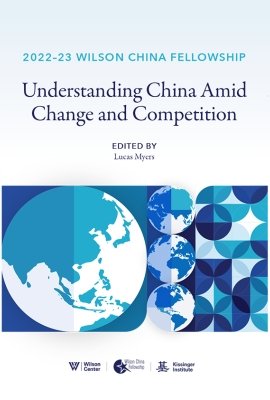Mao Lin
2022-23 Wilson China Fellow
Professional Affiliation
Associate Professor of History at Georgia Southern University
Expert Bio
Mao Lin is an associate professor of history at Georgia Southern University. His research focuses on American foreign relations, the Cold War, modern China, and especially US-China relations. Lin’s articles have appeared in a number of academic journals, covering a wide range of topics related to US-China relations. He has received several scholarships, including the 2020 Fulbright-Hays Seminars Abroad in Taiwan, the 2011 National Endowment for the Humanities, and the 2009 Marshall-Baruch Fellowship from the George C. Marshall Foundation. Lin holds a PhD in history from the University of Georgia. Currently he is working on a book project with the working title “U.S.-China Relations and the Diplomacy of Modernization, 1966-1979.”
Wilson Center Project
Bringing China Back Into the World: The Historical Origin of America’s Engagement Policy and Its Implications for Contemporary U.S.-China Relations
Project Summary
The project is designed to examine the historical origin of America’s engagement policy toward China and its implications for contemporary Sino-American relations. The central research agenda is to explore why and how America’s engagement policy was developed and why it seems to be viewed as a failure by many contemporary observers. The working hypothesis is that the engagement policy was grounded in a shared discourse on China’s modernization between America and China, which first gained currency between the late Johnson administration and the Carter administration, a period I call the “long 1970s.” My preliminary research reveals that during the long 1970s, Sino-American interactions were framed both explicitly and implicitly by perceptions of China’s modernization, the meaning of which was being constantly negotiated and imagined. This discourse on China’s modernization was generated both by assumptions underlining American foreign policy, such as the need to champion capitalism and liberal democracy, and by China’s understanding of the U.S.-led international order. The project will analyze the policy expectations generated by this discourse and evaluate the effectiveness of the engagement policy against those expectations.
It is important to understand the historical origin of the engagement policy because contemporary critics of the policy too often tend to read history selectively. Many critics argue that the successive American administrations’ obsession with strategic issues was to blame for the failure of engagement, as Washington, reluctant to destabilize U.S.-China strategic cooperation, turned a blind eye to issues that have become explosive in recent years. In a way, this argument is reinforced by the mainstream scholarship of U.S.-China relations during the long 1970s. The major tendency of that scholarship is to focus on issues, such as deteriorating Sino-Soviet relations, the war in Vietnam, the perceived common threat from the Soviet Union, Taiwan, arms control and other highly visible items on the agenda of U.S.-China rapprochement, in short, “high politics.” The so-called “triangular diplomacy”—Sino-Soviet-American geopolitical maneuvers in which America gradually sided with China against the Soviet Union—particularly occupies center stage of the scholarship. The focus on strategic issues, however, obscures the scope of America’s engagement with China. It has led to the argument that engagement was only a diplomatic expediency through which Beijing and Washington forged a tactic alliance against Moscow. In the absence of a common enemy and in the face of a rising China, engagement shall be declared a failure and abandoned. My project argues that a more balanced understanding of the dynamics of U.S.-China relations during the long 1970s has yet to be achieved in order that we can have a more informed assessment of the engagement policy. Traditional approaches preoccupied solely with geopolitical calculations of the Cold War are not sufficient in explaining the development of Sino-American relations. Although these strategic concerns contributed to Sino-American rapprochement, we can no longer afford to push aside issues such as economic and cultural relations between China and America as “low politics.” Thus, the discourse on China’s modernization can provide a holistic and more balanced approach. By historicizing and contextualizing America’s China policy, the project aims at achieving a nuanced way to evaluate the effectiveness of engagement.
Insight & Analysis by Mao Lin
- Publication
Bringing China Back into the World: The Historical Origin of America’s Engagement Policy and Its Implications for Contemporary US-China Relations
- By
- Mao Lin

- Publication
Executive Summary - 2022-23 Wilson China Fellowship
- By
- Matthew Erie,
- Kyle Jaros,
- Mao Lin,
- and 12 more

- Publication
2022-23 Wilson China Fellowship: Understanding China Amid Change and Competition

- Past event
- Strategic Competition
Wilson China Fellowship Conference 2023



